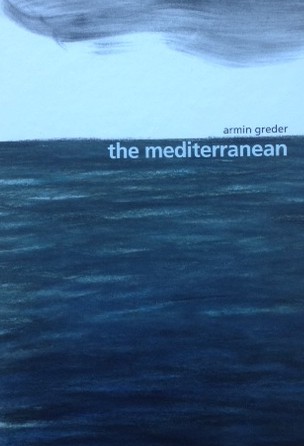Inspiring Older Readers
 posted on 13 Dec 2017
posted on 13 Dec 2017
The Mediterranean by Armin Greder
This is one of the most powerful and emotional books about refugees and asylum-seekers that I have ever read. And yet it’s barely 34 pages long and uses only 17 words on a blank page at the beginning of the book:
After he had finished drowning,
his body sank slowly
to the bottom,
where the fish
were waiting.
What takes over from this point is a series of quite superb drawings that tell the story of a grotesque and macabre ‘life cycle’ that will, if you have the tiniest scrap of a soul, make you both outraged and angry.
The pictures tell the story of the drowned refugee whose dead body sinks to the sea-bed to become fish food. The fish who have fed on him get caught by the fishermen who take them to market and sell them on to the restaurants. We see the fish being served in an exclusive establishment to men who we then discover are arms dealers selling guns to an African dictator who uses them to create conflict and repress his population. His people flee in fear seeking refuge and are picked up by people traders offering to send them to safety by boat – presumably for the right price. Of course the boat is over-filled and dangerous and so it sinks sending its human cargo to the depths where the cycle starts all over again.
The agony of the story is almost unbearable. A very useful afterword by Alessandro Leogrande tells us that Greder’s story is based on real events recorded by those monitoring the journeys of asylum seekers off the Sicilian coast. Following a disaster
..the fishermen of Portopalo began retrieving the(ir) bodies which had not yet decomposed. They would find the bodies caught up in their nets as they hoisted them onto their fishing boats, but rather than advise the authorities, they preferred to throw them back into the sea. That way they would avoid hassles from the coastguard, and would not have their fishing activity put on hold.
I have already eulogised the work of the Swiss-born Australian in this review for his previous book The City which is also a triumph of the humanitarian spirit. This though, is a much more angry book and you can feel that emotion in the compositions and in the execution of the drawing. There are no punches pulled here and we’re left in no doubt just how disgusted the artist is over not just the plight of the refugees but over the business interests that lie behind them. You could argue that this is as much an indictment of neo-colonial attitudes and the arms trade as it is of the way in which refugees have been treated. I think it’s clear what Greder wants us to take from this – the rich developed world is just as responsible for creating the refugee problem as it is for failing to find any solutions to it. Somewhere in all the gaps and moral obfuscations innocent people die terrible deaths – but still we fail to learn the lessons.
You sometimes think there are books that should be delivered free to every door or which should be part of any schoolroom or university course – and this is most definitely one of them.
Terry Potter
December 2017